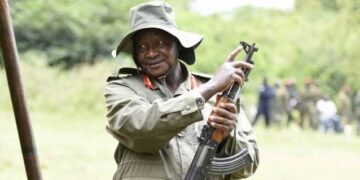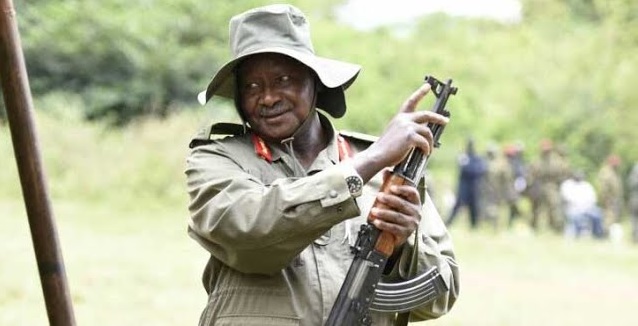By John Ikani
President Yoweri Museveni of Uganda has renewed his call to have all firearms in the army fingerprinted.
The Commander-in-Chief initially issued this directive five years ago, as part of a broader set of security measures he unveiled in 2018 during a period of heightened violence against prominent individuals.
Notable victims of violence between 2015 and 2018 included the then Arua Municipality Member of Parliament Ibrahim Abiriga, former police spokesperson Andrew Felix Kaweesi, former Buyende District police commander Muhammad Kirumira, and Muslim clerics.
The objective behind Gen Museveni’s call for fingerprinting weapons is to facilitate the identification of guns used in criminal activities.
This identification is achieved by comparing recovered spent cartridges with the recorded gun data in the system.
While other security forces like the police and prisons have largely complied, the Uganda People’s Defence Forces (UPDF) have hesitated to implement the directive.
Insiders suggest that the military’s reluctance is rooted in concerns that fingerprinting their guns might have unintended consequences.
They fear that it could expose incidents involving soldiers deployed on foreign assignments, potentially implicating Uganda and providing ammunition for the country’s adversaries.
Additionally, the army is worried about the security of the collected data, fearing that it might fall into the wrong hands.
President Museveni addressed this issue by stating, “The fingerprinting of guns of the security forces is helping to curb gun violence, but I hear they didn’t include the army. Why not the army? I have directed that all army guns must be fingerprinted like all the others were.”
He made this announcement during a ceremony where he presided over the graduation of 2,234 Uganda Prisons Service (UPS) officers at Kololo Independence Grounds in Kampala.
President Museveni’s renewed directive comes amid a recent increase in gun-related violence, including cases involving security personnel.
Some suspects in these crimes, such as the shooting death of Vlogger Ibrahim Tusubira, alias Ibra Olaxess, have not been apprehended, despite detectives recovering bullet casings at the crime scenes.
Sources have indicated that a lack of weapon data in the security records has hindered progress in these investigations.
Several recent crimes, including the murder of IBC Advocates employee Ronnie Mukisa in Wakiso District’s Makindye-Sebagabo Municipality in May, have been linked to the army.
UPDF soldiers Cpl Max Goefrey Anyase and Sgt Ayubu Rashid Okot, as well as former Kampala Metropolitan North Deputy Police Commander SP Vincent Irama and his brother, businessman Robert Irama Karedou, are currently facing prosecution at the military court for their involvement in the murder.
In a 2021 article titled “UPDF Declines to Fingerprint Guns,” this newspaper reported the military’s apprehensions regarding gun fingerprinting. This is due to the fact that military personnel, including both soldiers and covert operatives, possess a substantial number of firearms and operate both within and outside the country.
To address these concerns, the President’s latest directive stipulates that data collected from fingerprinted army guns should be stored by the military itself rather than the regular police.
“They can be kept separately, maybe under Military Police, but they should be fingerprinted,” the President emphasized, reiterating, “Every gun should be fingerprinted.”
Human rights activists argue that the recent surge in gun violence underscores the urgency of the Commander-in-Chief’s call. They contend that fingerprinted guns would have facilitated the identification of soldiers responsible for the deaths of at least 54 civilians during the suppression of the November 2020 pro-Robert Kyagulanyi, alias Bobi Wine, protests in and around Kampala.



































